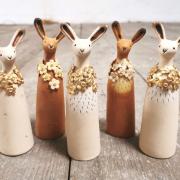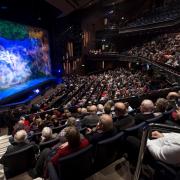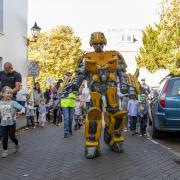Devon businesses can help you have a sustainable festive season

The festive season is typically a time of over consumption and after a turbulent year it feels like the pressure is on to ‘save’ 2020 by going all-out this Christmas.
But the season of giving is often a time of excess. Each year millions of tonnes of packaging, wrapping and unwanted gifts find themselves destined for landfill.
In a world where the disposable nature of the masks and gloves has become a part of our everyday lives, is Christmas a time for us to step back and think of our greater impact?
“We’re taking and using every single benefit this planet has to offer to the absolute extreme and it’s shocking,” says Emma Rhodes, who has been making sustainable soap for ten years.

Emma’s Soap, based in Strete, near Dartmouth, was born from a passion to create beautiful, planet-friendly soaps which are free from chemicals and palm oil.
Emma believes Christmas gifting is a time to reflect on what we can do better – thinking of not only the gifts themselves, but the way they are wrapped.
“I bought some paper tape to Exeter Christmas Market last year to wrap up people’s purchases and one woman couldn’t believe it – she said she had been searching everywhere for some and couldn’t find any,” she recalls.
“So much of the shiny Christmas wrapping paper is not recyclable and causes a huge amount of unnecessary waste going to landfill.

“This year we’ll be stocking recyclable paper as well as paper tape and wool for people to wrap parcels, so that everything is completely biodegradable.”
READ MORE: 10 great ways to make your own special Christmas presents this year
For a Christmas gift to be truly sustainable, it’s not just about being kind to the planet – there is also the human cost to consider.
Origin Africa, based in Chivenor, North Devon, is a sustainable fashion brand with a focus on slow, sustainable fashion, with 100% of the profits funding projects in Africa.
Owner Alice Cracknell says: “While the eco-aspects are important, it’s also about being people-friendly and also the purpose of that product.
“It’s about how the garment workers are paid, or what the money from the sale of that product is going towards. All of these things together make up if something is sustainable.”
The brand has also teamed up with fellow North Devon business Katherine Barber Jewellery to create a line of sustainable jewellery gifts for Christmas.
Katherine, based in Braunton, hand-crafts all her pieces to order to ensure there is no excess waste and uses recycled silver where possible.
“The jewellery industry tends to have a bit of a ‘dirty’ reputation when it comes to sustainability and to me it’s important to use recycled silver where I can,” says Katherine.
“I put a lot of love into the pieces I make and I like to think there is a transference of love when that gift is then passed onto someone. You don’t get that with a giant brand where everything is massed produced.”
This is a sentiment echoed by Lucy Willoughby, from South Brent, who set up online shop Good Things Gifts selling ethical, planet-friendly gifts, toys and games last year.
“I think there has to be a focus on buying less – but buying with purpose; purchasing things you really value and not just buying gifts for the sake of buying something,” she explains.
“Such a large percentage of children’s toys are made of plastic and they have, for example, metal components so they cannot even be recycled.
“Children grow out of toys quite quickly and I think one thing to think about is buying legacy or heritage gifts. Toys that can be passed down from generation to generation.”
When it comes down to it, buying sustainable gifts which consider their impact on the planet and the people who made them could make a huge difference this Christmas.
Reflecting on the last few months, Emma adds: “One thing COVID has taught us is that our local shops and independent traders are there for us through thick and thin.
“This Christmas should be about supporting independents, buying local and thinking about the products and packaging we buy more carefully.”
EATING ETHICALLY THIS CHRISTMAS
Having a sustainable Christmas extends far beyond the gifts we give – right down to what we put on the table.
“Everybody tends to go overboard at Christmas and I think shopping sustainably is about buying less but focusing on quality,” says Gary Willis, of The Meatbox Company.
“I think it’s important, now more than ever, to buy British and to buy local if you can.”
The Copplestone-based farm is pioneering sustainable and ethical farming techniques, and Gary says planning ahead and shopping locally can help reduce excess waste this Christmas.
Creating a meal plan, freezing leftovers, buying ethical meat and shopping in your local market for seasonal vegetables are all great ways to reduce your impact on the planet.
TIPS FOR SUSTAINABLE DECOR
Want a more eco-friendly way to decorate the house? Here are some ideas…
Use wine bottles to create candle holders, adding soft, natural light.
Reuse old decorations in inventive ways. Fill glass vases with old baubles or use them as placeholders on the table.
Go foraging for your own natural decorations. Holly leaves, pine cones and ivy can be made into wreaths, garlands and centrepieces.
For fairy lights, opt for LED bulbs instead of incandescent lights as these are more environmentally friendly and last a lot longer.
If you don’t want to boycott plastic-heavy crackers, why not make your own? That way you can choose the gifts inside and it’s a great Christmas crafting activity.
Join our Facebook group to keep up to date with the latest news, events and people in Devon



























